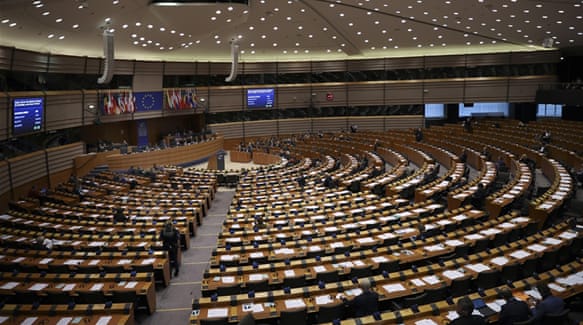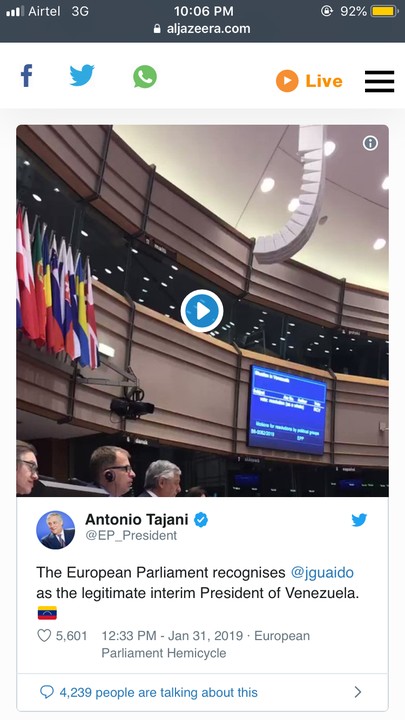European Union Parliament Recognizes Venezuela's Guaido As Interim President
EU Parliament Recognizes Venezuela's Guaido As Interim President
EU politicians voted 429 in favour to 104 against recognising the opposition leader as the interim leader.
The European Parliament has recognised Venezuela's self-declared interim president Juan Guaido as de facto head of state, heightening international pressure on the OPEC member's socialist President Nicolas Maduro.
EU politicians voted 429 in favour to 104 against, with 88 abstentions, at a special session in Brussels on Thursday to recognise Guaido as interim leader.
In a statement with the non-binding vote, the parliament urged the bloc's 28 governments to follow suit and consider Guaido "the only legitimate interim president" until there were "new free, transparent and credible presidential elections".
Though frequently accusing Maduro of stifling democracy, the European Union, wary of setting a precedent of recognising self-declared leaders, has been reluctant to follow the United States and most Latin American nations in their immediate recognition of Guaido.
Britain, France, Germany and Spain said on Saturday, however, that they would recognise Guaido unless Maduro called elections within eight days.
But the EU as a whole has not set a time limit in its call for a new presidential vote.
Maduro has dismissed the demands, calling them an unacceptable ultimatum from the corrupt elite of spent colonial powers.
"The leaders of Europe are sycophants, kneeling behind the policies of Donald Trump," he said over the weekend.
Maduro accuses the US and other countries of waging an economic war aimed at removing him from power.
The European Parliament has no foreign policy powers but sees itself as a champion of human rights.
"Those who are demonstrating today in the streets of Venezuela are not Europeans, but they fight for the same values for which we fight," Spanish centre-right EU politician Esteban Gonzalez Pons said in a statement.
Guaido said that this recognition by the European Parliament represented a "great step" towards the fight for democracy in Venezuela.
"We have taken a big step in our struggle for democracy!," Guaido wrote on Twitter.
"We appreciate the decision [taken by] the European Parliament [it] recognise[s] all the effort that we Venezuelans have put forward for the restitution of constitutional order in our country"
'Rupture of democracy'
As Venezuela sank into an economic and political crisis that brought mass emigration and hyperinflation, the EU imposed an arms embargo and sanctions on officials to decry what it views as rights violations and the rupture of democracy.
On Thursday, the Brussels-based International Federation of Journalists said seven foreign journalists had been detained in Venezuela, including French and Spanish reporters. EU foreign policy chief Federica Mogherini called for their release.
Foreign ministers were due to discuss the crisis in Venezuela at a two-day meeting in Bucharest this week.
British Foreign Secretary Jeremy Hunt, who spoke to Guaido by telephone on Wednesday, said the bloc should consider more asset freezes and travel bans on Venezuelan officials.
"Targeted sanctions against the kleptocrats who have enriched themselves on the back of the rest of the population who are very poor, that is something I think can be effective," Hunt said in a Foreign and Commonwealth Office statement


EU politicians voted 429 in favour to 104 against recognising the opposition leader as the interim leader.
The European Parliament has recognised Venezuela's self-declared interim president Juan Guaido as de facto head of state, heightening international pressure on the OPEC member's socialist President Nicolas Maduro.
EU politicians voted 429 in favour to 104 against, with 88 abstentions, at a special session in Brussels on Thursday to recognise Guaido as interim leader.
In a statement with the non-binding vote, the parliament urged the bloc's 28 governments to follow suit and consider Guaido "the only legitimate interim president" until there were "new free, transparent and credible presidential elections".
Though frequently accusing Maduro of stifling democracy, the European Union, wary of setting a precedent of recognising self-declared leaders, has been reluctant to follow the United States and most Latin American nations in their immediate recognition of Guaido.
Britain, France, Germany and Spain said on Saturday, however, that they would recognise Guaido unless Maduro called elections within eight days.
But the EU as a whole has not set a time limit in its call for a new presidential vote.
Maduro has dismissed the demands, calling them an unacceptable ultimatum from the corrupt elite of spent colonial powers.
"The leaders of Europe are sycophants, kneeling behind the policies of Donald Trump," he said over the weekend.
Maduro accuses the US and other countries of waging an economic war aimed at removing him from power.
The European Parliament has no foreign policy powers but sees itself as a champion of human rights.
"Those who are demonstrating today in the streets of Venezuela are not Europeans, but they fight for the same values for which we fight," Spanish centre-right EU politician Esteban Gonzalez Pons said in a statement.
Guaido said that this recognition by the European Parliament represented a "great step" towards the fight for democracy in Venezuela.
"We have taken a big step in our struggle for democracy!," Guaido wrote on Twitter.
"We appreciate the decision [taken by] the European Parliament [it] recognise[s] all the effort that we Venezuelans have put forward for the restitution of constitutional order in our country"
'Rupture of democracy'
As Venezuela sank into an economic and political crisis that brought mass emigration and hyperinflation, the EU imposed an arms embargo and sanctions on officials to decry what it views as rights violations and the rupture of democracy.
On Thursday, the Brussels-based International Federation of Journalists said seven foreign journalists had been detained in Venezuela, including French and Spanish reporters. EU foreign policy chief Federica Mogherini called for their release.
Foreign ministers were due to discuss the crisis in Venezuela at a two-day meeting in Bucharest this week.
British Foreign Secretary Jeremy Hunt, who spoke to Guaido by telephone on Wednesday, said the bloc should consider more asset freezes and travel bans on Venezuelan officials.
"Targeted sanctions against the kleptocrats who have enriched themselves on the back of the rest of the population who are very poor, that is something I think can be effective," Hunt said in a Foreign and Commonwealth Office statement


Comments
Post a Comment
Kindly tell us what is in your mind here